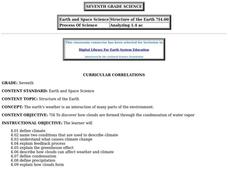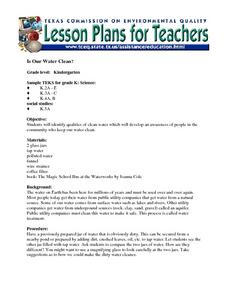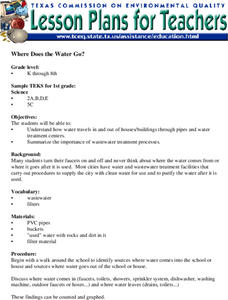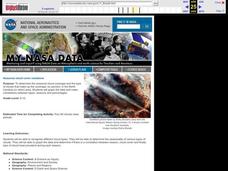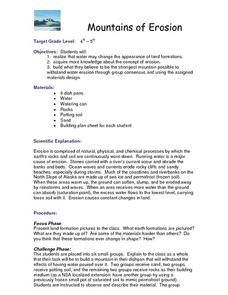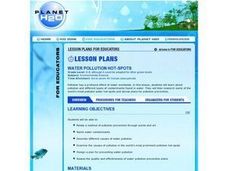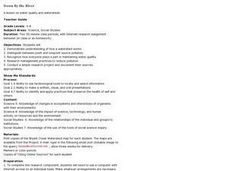Curated OER
King of the Mound
Students investigate water as an agent of change. They conduct an experiment involving a mound of soil, observe and record any changes that occur when ice melts on the mound of dirt, and create a drawing of the changes that take place...
Curated OER
Spring is Sprung
Students participate in a science experiment that shows them how water moves around in plants. They see how food coloring moves up a celery stalk to simulate how water moves up through roots in plants. They make predictions before the...
Curated OER
Beans Are Seeds
Second graders read literature regarding the growth of seeds. They investigate how seeds need water and light to sprout and then grow. They experiment by planting their own bean seeds. They record the progress of their seeds in both...
Curated OER
Structure of the Earth
Seventh graders study the cause of climate change, and how clouds form and affect weather. They define condensation and precipitation, the greenhouse effect and the water cycle.
Michigan Sea Grant
Water Quality
Learners observe water samples and measure the samples' water quality. Students develop their own criteria for measuring water quality and test for temperature, acidity, oxygen levels, turbidity, conductance, sediment and hardness.
Curated OER
The Weight of Water
Students examine how salt water is more dense than fresh water. They discuss how manatees need to float and sink, conduct a sink or float experiment, and conduct an experiment with eggs and salt and fresh water.
Michigan Sea Grant
Exploring Watersheds
Collaboratively, students partake in a hands-on activity in which they build models of a watershed. Each group member draws an elevation map—a bird's eye view—of their model and predicts how water will flow from the high to low points....
Curated OER
Is Our Water Clean?
Students identify qualities of clean water and develop an awareness of people in the community who keep our water clean.
Curated OER
Where Does the Water Go?
Students examine how water travels in and out of houses through pipes. They discover how water is treated and discuss the importance of the treatment centers. They participate in an experiment with different size piping and water.
Curated OER
Measuring Water Vapor: The Microwave Water Radiometer (MWR)
Students investigate water vapor. They view and analyze photos, conduct Internet research, and analyze the total water vapor/total liquid water data plot.
Curated OER
Seasonal Cloud Cover Variations
Students recognize different cloud types. They determine the seaonality of various types of clouds. They graph the data and determine if a correlation exists between season, cloud cover and type of clouds most prevalent during each season.
Curated OER
Understanding Cloud Formation
Learners view a demonstration that simulates cloud formation. They read a poem about clouds, participate in a class demonstration using warm water and ice and write a paragraph summarizing their observations.
Curated OER
Charleston Bump Expedition Eddies, Gyres and Drowning Machines
Students describe at least three types of effect that physical obstructions may have on water flowing past the obstructions. Students explain at least three ways in which current flow can be significant to benthic organisms.
Curated OER
Mountains of Erosion
Students study the change in land formations due to water erosion. They work in groups to build a model of a mountain that will be composed of materials that will best withstand water erosion.
Curated OER
Water Pollution Hot-Spots
Students complete internet research in small groups to identify types of water pollution, spotlight water pollution hot-spots, and design a plan for water prevention.
Curated OER
Spin Cycle
Students explore the concept of "spin" and discuss how politicians use spin to sway public opinion. A leading American politician is selected and talking points that exemplify the main idea of this lesson are shared with the class.
Curated OER
Develop a Hypothesis
Learners develop a hypothesis regarding the quality of a nearby body of water. They analyze locally collected data and compare it with data from different areas. They evaluate their original hypothesis as part of a larger unit.
Curated OER
Types of Pollution
Students differentiate between various types of water pollution and complete a Venn diagram with the information. They consider why there are laws regulating the release of pollution in water and discuss solutions to pollution problems.
Curated OER
Down By the River
Students examine how watersheds work and determine the difference between point and nonpoint source pollution. They research management practices to reduce pollution and investigate how everyone can participate in reducing water pollution.
Curated OER
Watersheds, Watersheds Everywhere
Students identify the watershed in which their school is located. They use maps to locate their homes and school. They define and use the correct vocabulary.
Curated OER
Kids for Conservation: Water Conservation Winter
Students rotate through various hands on and critical thinking activites designed to show the amount of water actually used by various people, companies, etc..., and helpful ways of conseving water.
Curated OER
Journey of a Raindrop to the Chesapeake Bay
Young scholars explore the water cycle and the path a single drop of water would take if it traveled from their schoolyard to the Chesapeake Bay in Virginia.
Curated OER
Lesson 3 - Water Above the Ground
Students define surface water, drainage basin or watershed. They investigate what affects runoff in a drainage basin. They complete lab sheets and worksheets.
Curated OER
How Safe Is Your Backyard?
Seventh graders investigate the safety of soil and water locally and communicate via the Internet with students in different locales sharing information. They research the Internet using its multimedia capabilities and collate the data...





